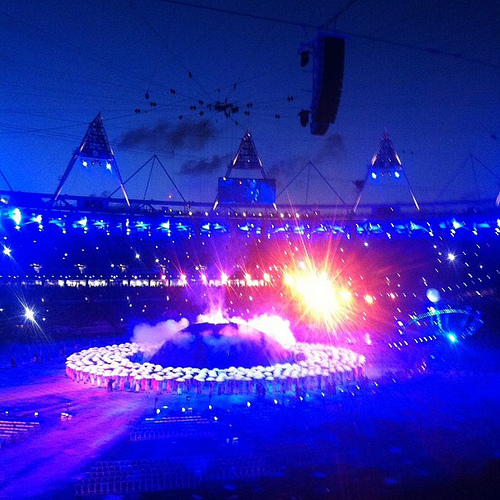


“There is no such thing as a standard or run-of-the-mill human being, but we share the same human spirit.”
So said physicist Stephen Hawking at the onset of the Opening Ceremonies for the 14th Paralympic Games Wednesday night in London. The Associated Press story found on ESPN.com from which I pulled this quote provides a solid recounting of the pageantry witnessed by the 60,000 audience members in Olympic Stadium, which included Queen Elizabeth II as well as the new faces of the Royal Family: Prince William and his wife, Kate (nee Middleton), also known as the Duke and Duchess of Cambridge.
Thank goodness we live in the Internet Age, though; because something as wondrous as Wednesday’s Opening Ceremonies, entitled “Enlightenment,” deserves to be approached from a multitude of perspectives in order to prove that, by highlighting the individuality of people with disabilities, we are all indeed one and the same.
Without the Web, we would be fortunate if more than one photo accompanied any kind of printed article. Instead, we can find the Getty Images gallery on SFGate.com, online home of the San Francisco Chronicle, with 45 full-color photographs that make it easy to see why writers like Sophie Brown from the Wired blog, GeekMom, felt it was “equally as good, if not better, than the opening ceremony of the Olympic Games almost five weeks ago.”
Nor would we enjoy the access we have to the sociopolitical elements that pervade the Paralympics as much as any other competition where nations come together. A UK-based blogger who goes by the handle Bendygirl tweeted that the contingency of athletes from host country Great Britain were making a political statement akin to the one by the African-American gold and bronze medalists, Tommie Smith and John Carlos, during the 1968 Olympics in Mexico. That historic moment is also referenced, and further elaborated upon, in this article by Peter Beresford of The Guardian, who reminds us that the rhetoric of sport doesn’t always match the reality with regard to support services and employment opportunities for people with disabilities.
Meanwhile, in other countries the games are a chance to demonstrate strides being made toward inclusion of these individuals. Jason Strother contributes this story to The Christian Science Monitor about Rim Ju-song, North Korea’s first Paralympic athlete. In a nation where people with disabilities are historically isolated from their families and communities, the 16-year old freestyle swimmer is being looked upon as a tangible impact of recent policy shifts in the country, as Strother notes:
[North Korea] passed a law in 2003 that promised free medical care and special education. In 2009 Pyongyang assured the United Nations that its disabled were receiving proper care and schooling. And North Korea gained provisional membership in the International Paralympic Committee earlier this year.
Call me strange, but even finding stories about steps to curb cheating in the Paralympic Games give me a good feeling; whether it’s the fact that wheelchair athletes try to enhance performance through a practice called “boosting” — detailed in this Daily Mail story — or that back during the 2000 Paralympics in Sydney, Australia, or that the entire Spanish contingent was seemingly complicit in “one of the most brazen acts of cheating in sports history,” according to Sonia Van Gilder Cooke of TIME magazine.
Stories like these are reminders that everyone is capable of losing perspective on the meaning of what is supposed to be an amateur athletic competition intended only to make life matter a little more for those of us in the stands. That may not be the side of the human spirit that Hawking was referring to in his remarks, but nevertheless we all share it regardless of our ability.
Comments?
Image by insideology (annie).